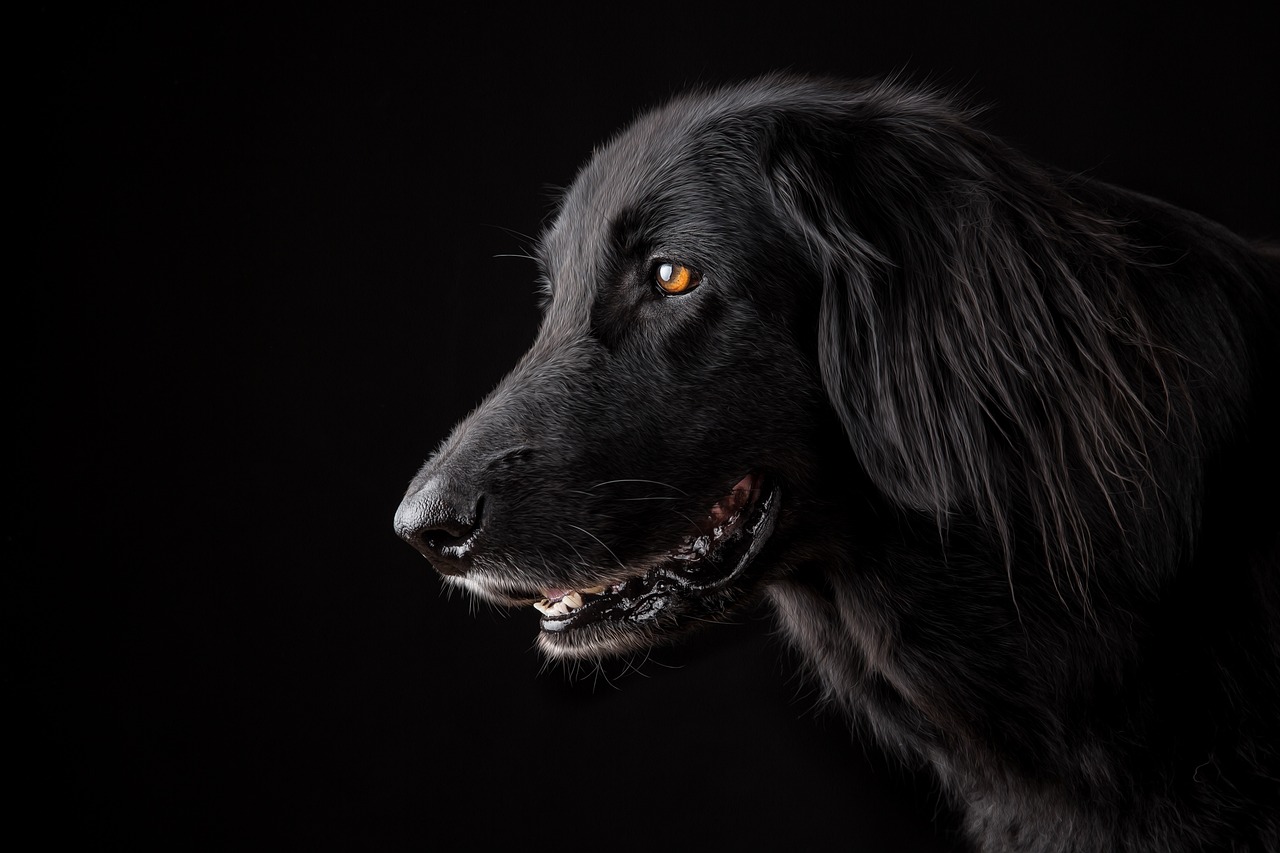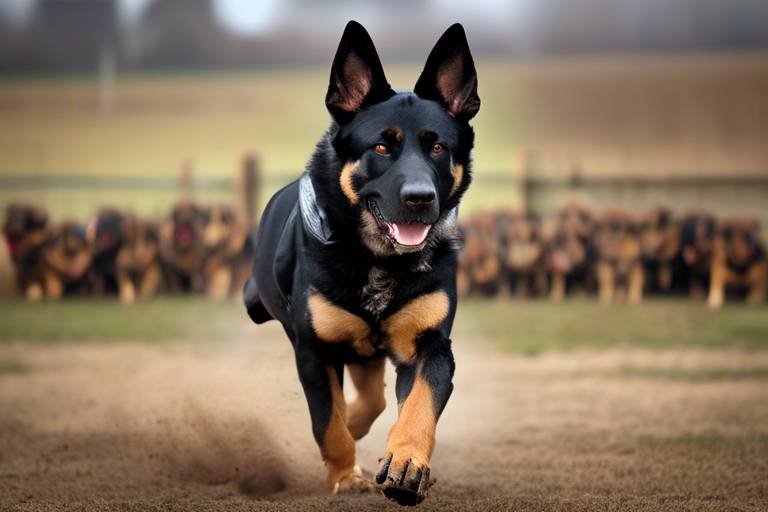The Characteristics of the Boxer Dog - A Family Favorite
When it comes to choosing a family pet, the Boxer dog stands out as a remarkable choice for many households. Their unique combination of playfulness, affection, and protectiveness makes them more than just pets; they become cherished family members. Boxers are known for their energetic spirit, often bringing a lively atmosphere to any home. Imagine a dog that not only plays but also keeps you on your toes with their antics—this is the essence of the Boxer. They are often described as the clowns of the canine world, with a knack for making everyone laugh and smile. Their loyalty is unwavering, and they form strong bonds with their human companions, making them feel like part of the family. It's no wonder that Boxers are adored by families across the globe.
Boxers are known for their playful and energetic nature. Their loyalty and affection towards family members make them excellent companions, often displaying a clownish demeanor that endears them to both adults and children. They thrive on interaction and are always eager to participate in family activities. Whether it's a game of fetch in the backyard or snuggling on the couch during movie night, Boxers are always ready to join in. Their intelligence and curiosity also make them quick learners, which is why they can adapt to various lifestyles and environments.
The physical attributes of a Boxer are as striking as their personality. With a muscular build and distinctive square-shaped head, they possess a unique appearance that turns heads wherever they go. Their short coat, which comes in a variety of colors, including fawn and brindle, requires minimal grooming. This low-maintenance aspect makes them a practical choice for busy families who still want a dog that looks great. Boxers are medium to large-sized dogs, typically weighing between 65-80 pounds for males and 50-65 pounds for females. This size contributes to their playful yet protective nature, making them great family guardians.
In terms of size, Boxers are categorized as medium to large dogs. Males usually weigh between 65-80 pounds, while females weigh around 50-65 pounds. Their sturdy build not only adds to their striking appearance but also enhances their protective instincts. With their size, Boxers can easily play with children while also serving as a watchful guardian for the family. It's almost like having a big, furry bodyguard who loves to play!
Boxers can be found in a range of coat colors, including fawn and brindle. Their striking appearance is complemented by their expressive eyes and strong, muscular physique, making them stand out in any setting. The short coat is not only beautiful but also practical, as it requires minimal grooming. This means more time for play and bonding with your furry friend!
The average lifespan of a Boxer is around 10-12 years. Understanding their health needs and potential genetic issues can help ensure a long, happy life for these energetic companions. Regular veterinary check-ups are essential to monitor their health and catch any potential issues early on. After all, a healthy Boxer is a happy Boxer, and nothing beats the joy of having your loyal companion by your side for years to come.
Boxers are high-energy dogs that require regular exercise to stay healthy and happy. Daily walks, playtime, and mental stimulation are essential to prevent boredom and destructive behaviors. Think of them as the athletes of the dog world; they need to run, jump, and play to keep their spirits high. Engaging them in activities like fetch or agility training not only fulfills their exercise needs but also strengthens the bond between you and your Boxer.
Early training and socialization are crucial for Boxers. Their intelligence and eagerness to please make them relatively easy to train, but consistent, positive reinforcement methods work best for this breed. Start training as soon as you bring your Boxer home, and you'll be amazed at how quickly they pick up commands and tricks. It's like watching a light bulb go off in their heads!
Boxers respond well to obedience training, which helps establish good behavior patterns. Engaging training sessions can also strengthen the bond between the dog and its owner, fostering a loving relationship. Remember, training should be fun for both you and your Boxer. Use treats, praise, and playtime as rewards to keep them motivated and excited.
Proper socialization from a young age is vital for Boxers to develop good manners around other pets and people. Exposing them to different environments, sounds, and experiences will help them become well-rounded adults. Think of socialization as giving your Boxer a passport to the world—one that allows them to explore and enjoy life to the fullest!
Like all breeds, Boxers are prone to certain health issues, including hip dysplasia and heart conditions. Regular veterinary check-ups and a healthy diet can help manage these risks effectively. It's essential to stay informed about your dog's health and be proactive in seeking veterinary care when needed.
Understanding common health concerns in Boxers can aid in early detection and treatment. Regular monitoring for symptoms can lead to prompt veterinary intervention, ensuring a better quality of life for your pet. Some common health issues to be aware of include:
- Hip Dysplasia
- Heart Conditions
- Allergies
Preventive care, including vaccinations, dental hygiene, and a balanced diet, plays a crucial role in maintaining a Boxer's health. Establishing a routine with a veterinarian can help keep your dog in optimal condition. Think of it as a team effort between you and your vet to keep your Boxer happy and healthy!
Q: Are Boxers good with children?
A: Yes! Boxers are known for their playful and affectionate nature, making them great companions for children.
Q: How much exercise do Boxers need?
A: Boxers require regular exercise, including daily walks and playtime, to stay healthy and happy.
Q: What health issues are Boxers prone to?
A: Boxers can be prone to hip dysplasia and heart conditions, so regular vet check-ups are essential.
Q: How long do Boxers typically live?
A: The average lifespan of a Boxer is around 10-12 years.

Temperament and Personality
Boxers are renowned for their playful and energetic nature, which makes them a delightful addition to any family. Imagine having a furry friend who greets you with boundless enthusiasm after a long day—this is the essence of a Boxer! Their loyalty is unmatched; they form a strong bond with their family members, often following them around the house as if they were their personal shadows. This devotion is coupled with a natural affection that makes Boxers excellent companions for both adults and children.
One of the most charming traits of Boxers is their clownish demeanor. They often engage in playful antics that never fail to bring a smile to your face. Whether it's bouncing around the yard or playfully nudging you for attention, their antics can lighten the mood in any household. Boxers are not just dogs; they are family entertainers who thrive on interaction and love being the center of attention.
Furthermore, Boxers are known for their protective instincts. They may have a playful side, but when it comes to their loved ones, they can be quite serious. Their natural guarding instincts make them vigilant protectors, always alert to any potential threats. This combination of playfulness and protectiveness creates a unique dynamic, making them not only fun companions but also reliable family guardians.
In terms of social behavior, Boxers tend to be friendly and sociable. They generally get along well with other pets and are known to be good with children. However, early socialization is key to ensuring they develop into well-mannered adults. Exposing them to various environments, people, and other animals will help them become confident and well-rounded. After all, a well-socialized Boxer is a happy Boxer!
In summary, Boxers are a blend of affection, loyalty, and playfulness that makes them a beloved choice for families. Their ability to bond deeply with their humans, coupled with their entertaining personality, ensures that life with a Boxer is never dull. If you're considering adding a Boxer to your family, be prepared for a lifetime of love, laughter, and protective companionship.

Physical Appearance
The Boxer’s muscular build and distinctive square-shaped head truly set them apart from other breeds. With a body that exudes strength and agility, it’s hard not to be captivated by their striking presence. Boxers are often described as being athletic and powerful, and they carry their weight with a sense of grace that is both impressive and appealing. Their short coat, which comes in a variety of colors, is another hallmark of their appearance. Not only does this coat require minimal grooming, making them a practical choice for busy families, but it also highlights their robust physique.
Boxers are typically classified as medium to large-sized dogs. Here’s a quick overview of their size and weight:
| Gender | Weight Range |
|---|---|
| Males | 65-80 pounds |
| Females | 50-65 pounds |
This size not only contributes to their playful yet protective nature but also makes them suitable for various living situations, from apartments to larger homes with backyards. Their size is complemented by their expressive eyes that seem to communicate their emotions, whether it’s joy during playtime or a watchful gaze when they’re on guard.
When it comes to coat colors, Boxers can be found in a range of stunning shades. The most common colors include:
- Fawn: A light tan color that can vary from pale to rich gold.
- Brindle: A fawn base with dark stripes, giving them a unique and eye-catching look.
- White: While less common, some Boxers have predominantly white coats that are equally striking.
This variety in color adds to their appeal, allowing families to choose a Boxer that fits their personal style. Furthermore, their strong, muscular physique is not just for show; it plays a crucial role in their ability to engage in various activities, from running and playing fetch to protecting their loved ones.
In terms of life expectancy, Boxers typically live around 10-12 years. While they are known for their vitality, understanding their health needs and potential genetic issues is vital for ensuring they lead long, happy lives. Regular check-ups and a nutritious diet can significantly impact their overall well-being.
Size and Weight
The Boxer is a remarkable breed, not just for its lively personality but also for its impressive . Typically, Boxers fall into the medium to large category, which contributes to their robust and energetic nature. Adult male Boxers generally weigh between 65 to 80 pounds, while females are a bit lighter, averaging around 50 to 65 pounds. This size range allows them to be both playful companions and protective guardians, striking a balance that many families appreciate.
One of the fascinating aspects of Boxers is how their size complements their personality. Their muscular build is not just for show; it's a reflection of their high energy levels and playful demeanor. When you see a Boxer bounding around, you can't help but notice their strong legs and powerful physique, which enable them to perform impressive leaps and bounds, making playtime a joy for both the dog and its family.
Moreover, the size of a Boxer can influence its role within the family. For instance, larger Boxers often take on a more protective stance, watching over children and other pets with a sense of duty. However, regardless of their size, all Boxers share a common trait: they thrive on companionship and love to be involved in family activities. This makes them not just pets, but integral members of the household.
Here's a quick reference table to summarize the typical size and weight of Boxers:
| Gender | Weight Range | Height Range |
|---|---|---|
| Males | 65-80 lbs | 21.5-25 inches |
| Females | 50-65 lbs | 20-24 inches |
Understanding the size and weight of Boxers can help potential owners prepare for their needs and lifestyle. Whether you’re considering adopting a Boxer or you already have one, knowing their physical characteristics can enhance your experience with this affectionate breed. They may be large, but their hearts are even bigger, making them a beloved choice for families across the globe.
- What is the ideal weight for a Boxer? The ideal weight varies between males (65-80 lbs) and females (50-65 lbs), depending on their age and health.
- How tall do Boxers typically get? Boxers usually stand between 20-25 inches tall, depending on their gender.
- Are Boxers good with children? Yes, Boxers are known for their playful and protective nature, making them excellent companions for children.
- Do Boxers require a lot of exercise? Absolutely! Boxers are high-energy dogs that need regular exercise to stay healthy and happy.
Coat Colors
Boxers are not only known for their vibrant personalities but also for their striking coat colors that add to their charm. The most common coat colors for Boxers include fawn and brindle, each offering a unique aesthetic appeal. Fawn Boxers have a light golden hue, which can range from a pale yellow to a deep, rich tan. On the other hand, brindle Boxers showcase a beautiful pattern of dark stripes over a lighter base color, creating a stunning visual effect that turns heads wherever they go.
In addition to these primary colors, Boxers can also exhibit a variety of shades and markings. Some Boxers may have white markings on their face, chest, and legs, which can enhance their overall appearance. It's worth noting that the AKC (American Kennel Club) recognizes a few specific color combinations, which include:
| Coat Color | Description |
|---|---|
| Fawn | Light golden to deep tan with possible white markings. |
| Brindle | Dark stripes on a lighter base, often fawn. |
| White | Entirely white coat, often with minimal color markings. |
Boxers are truly a sight to behold, and their coat colors can reflect their individual personality traits. A fawn Boxer might exude warmth and friendliness, while a brindle Boxer could come off as a bit more mysterious and intriguing. Regardless of their coat color, one thing is for sure: Boxers are sure to stand out in any crowd, making them not just great companions but also a visual delight for any family.
- What are the most common coat colors for Boxers? The most common coat colors are fawn and brindle.
- Do coat colors affect a Boxer's temperament? No, coat color does not affect temperament; it is more about individual personality.
- Are white Boxers less healthy than colored Boxers? White Boxers can be prone to certain health issues, but with proper care, they can live healthy lives.
Life Expectancy
This article explores the unique traits of Boxer dogs, highlighting their personality, physical attributes, and suitability as family pets, making them a beloved choice for many households.
Boxers are known for their playful and energetic nature. Their loyalty and affection towards family members make them excellent companions, often displaying a clownish demeanor that endears them to both adults and children.
The Boxer’s muscular build and distinctive square-shaped head give them a unique appearance. Their short coat, which comes in various colors, requires minimal grooming, making them a practical choice for busy families.
Typically, Boxers are medium to large-sized dogs, with males weighing between 65-80 pounds and females 50-65 pounds. Their size contributes to their playful yet protective nature, making them great family guardians.
Boxers can be found in a range of coat colors, including fawn and brindle. Their striking appearance is complemented by their expressive eyes and strong, muscular physique, making them stand out in any setting.
The average lifespan of a Boxer is around 10-12 years. However, just like humans, their life expectancy can be influenced by various factors. Proper care, nutrition, and regular veterinary visits play a crucial role in ensuring your Boxer lives a long and fulfilling life. Here are some key aspects to consider:
- Genetics: Some Boxers may inherit genetic predispositions to certain health issues, which can impact their longevity.
- Diet: A balanced diet rich in nutrients can significantly enhance their overall health and lifespan.
- Exercise: Regular physical activity is essential for maintaining a healthy weight and preventing obesity-related diseases.
- Preventive Care: Routine veterinary check-ups can catch potential health problems early, leading to better outcomes.
Understanding their health needs and potential genetic issues can help ensure a long, happy life for these energetic companions. By being proactive about their health, you can enjoy many years of joy and companionship with your Boxer.
Boxers are high-energy dogs that require regular exercise to stay healthy and happy. Daily walks, playtime, and mental stimulation are essential to prevent boredom and destructive behaviors.
Early training and socialization are crucial for Boxers. Their intelligence and eagerness to please make them relatively easy to train, but consistent, positive reinforcement methods work best for this breed.
Boxers respond well to obedience training, which helps establish good behavior patterns. Engaging training sessions can also strengthen the bond between the dog and its owner, fostering a loving relationship.
Proper socialization from a young age is vital for Boxers to develop good manners around other pets and people. Exposing them to different environments, sounds, and experiences will help them become well-rounded adults.
Like all breeds, Boxers are prone to certain health issues, including hip dysplasia and heart conditions. Regular veterinary check-ups and a healthy diet can help manage these risks effectively.
Understanding common health concerns in Boxers can aid in early detection and treatment. Regular monitoring for symptoms can lead to prompt veterinary intervention, ensuring a better quality of life for your pet.
Preventive care, including vaccinations, dental hygiene, and a balanced diet, plays a crucial role in maintaining a Boxer's health. Establishing a routine with a veterinarian can help keep your dog in optimal condition.
1. How long do Boxers typically live?
Boxers generally have a lifespan of 10-12 years, but with proper care, some can live longer.
2. Are Boxers good with children?
Yes, Boxers are known for their playful and affectionate nature, making them great companions for children.
3. Do Boxers require a lot of exercise?
Absolutely! Boxers are high-energy dogs that need regular exercise to stay healthy and happy.
4. What are common health issues in Boxers?
Boxers can be prone to hip dysplasia, heart conditions, and certain cancers, so regular vet check-ups are essential.
Exercise Needs
This article explores the unique traits of Boxer dogs, highlighting their personality, physical attributes, and suitability as family pets, making them a beloved choice for many households.
Boxers are known for their playful and energetic nature. Their loyalty and affection towards family members make them excellent companions, often displaying a clownish demeanor that endears them to both adults and children.
The Boxer’s muscular build and distinctive square-shaped head give them a unique appearance. Their short coat, which comes in various colors, requires minimal grooming, making them a practical choice for busy families.
Typically, Boxers are medium to large-sized dogs, with males weighing between 65-80 pounds and females 50-65 pounds. Their size contributes to their playful yet protective nature, making them great family guardians.
Boxers can be found in a range of coat colors, including fawn and brindle. Their striking appearance is complemented by their expressive eyes and strong, muscular physique, making them stand out in any setting.
The average lifespan of a Boxer is around 10-12 years. Understanding their health needs and potential genetic issues can help ensure a long, happy life for these energetic companions.
Boxers are high-energy dogs that require regular exercise to stay healthy and happy. Imagine a child who has just had a sugar rush—this is the level of energy a Boxer can exhibit! Daily walks, playtime, and mental stimulation are essential to prevent boredom and destructive behaviors. A Boxer that doesn't get enough exercise can quickly turn into a whirlwind of chaos at home, showcasing their playful yet sometimes mischievous nature.
To keep your Boxer in tip-top shape, aim for at least 60 to 90 minutes of exercise each day. This can include:
- Long walks in the park
- Interactive play sessions with toys
- Agility training to challenge their minds
- Playdates with other dogs to encourage socialization
Incorporating a variety of activities not only helps burn off their energy but also strengthens the bond between you and your furry friend. After all, nothing beats the joy of seeing your Boxer bound through the grass, tongue lolling out, as they chase after a ball or frolic with their human. Remember, a tired Boxer is a happy Boxer!
Early training and socialization are crucial for Boxers. Their intelligence and eagerness to please make them relatively easy to train, but consistent, positive reinforcement methods work best for this breed.
Boxers respond well to obedience training, which helps establish good behavior patterns. Engaging training sessions can also strengthen the bond between the dog and its owner, fostering a loving relationship.
Proper socialization from a young age is vital for Boxers to develop good manners around other pets and people. Exposing them to different environments, sounds, and experiences will help them become well-rounded adults.
Like all breeds, Boxers are prone to certain health issues, including hip dysplasia and heart conditions. Regular veterinary check-ups and a healthy diet can help manage these risks effectively.
Understanding common health concerns in Boxers can aid in early detection and treatment. Regular monitoring for symptoms can lead to prompt veterinary intervention, ensuring a better quality of life for your pet.
Preventive care, including vaccinations, dental hygiene, and a balanced diet, plays a crucial role in maintaining a Boxer's health. Establishing a routine with a veterinarian can help keep your dog in optimal condition.
Q: How much exercise do Boxers need?
A: Boxers typically need at least 60 to 90 minutes of exercise each day to stay healthy and happy.
Q: Are Boxers good with children?
A: Yes! Boxers are known for their playful and affectionate nature, making them great companions for kids.
Q: Do Boxers require a lot of grooming?
A: No, Boxers have a short coat that requires minimal grooming, making them a practical choice for busy families.
Q: What are common health issues in Boxers?
A: Boxers can be prone to hip dysplasia and heart conditions, so regular vet check-ups are essential.

Training and Socialization
Training and socialization are essential components in raising a well-mannered Boxer. These dogs are not only intelligent but also eager to please, making them relatively easy to train if approached correctly. However, it's important to remember that Boxers thrive on positive reinforcement. This means rewarding them with treats, praise, or playtime when they exhibit desired behaviors. Using harsh methods can backfire, leading to fear or aggression, which is the last thing you want in a family pet.
Start training your Boxer as early as possible. Puppies are like little sponges, soaking up everything around them, and this is the perfect time to instill good habits. Basic commands such as sit, stay, and come should be your starting point. These commands not only help in managing your dog but also build a foundation for more advanced training later on. Keep the training sessions short and engaging, typically around 5-10 minutes, as Boxers can lose interest quickly. Incorporating fun activities into training can maintain their enthusiasm and motivation.
Socialization is just as critical as training. Exposing your Boxer to various environments, people, and other animals helps them develop into well-rounded adults. A well-socialized Boxer will be more confident and less likely to exhibit behavioral issues. Aim to introduce your dog to different experiences, such as:
- Meeting new people and children
- Interacting with other dogs
- Exploring different environments, like parks or busy streets
- Encountering various sounds, such as traffic or household noises
These experiences should be positive, so always reward your Boxer for calm behavior. It's also beneficial to enroll your dog in a puppy kindergarten class, where they can learn basic commands while socializing with other dogs. This not only helps them learn but also provides a great opportunity for you to meet other dog owners and share tips.
Lastly, remember that consistency is key. Establishing a routine for training and socialization will help your Boxer understand expectations and reduce anxiety. Regular practice will reinforce their learning, making them more reliable companions. So, grab some treats, find a few friends or other dogs, and get started on this exciting journey of training and socialization!
| Question | Answer |
|---|---|
| How long should training sessions be? | Training sessions should be around 5-10 minutes to keep your Boxer engaged. |
| What is the best way to socialize my Boxer? | Expose them to various environments, people, and other animals in a positive manner. |
| Can Boxers be trained off-leash? | With proper training and a strong recall command, Boxers can be trained off-leash in safe environments. |
| What are some common behavioral issues in Boxers? | Without proper training and socialization, Boxers may exhibit jumping, barking, or aggressive behaviors. |
Obedience Training
When it comes to for your Boxer, the journey can be both rewarding and enjoyable. These dogs are not just known for their playful antics; they are also remarkably intelligent and eager to please. This combination makes them relatively easy to train, especially when you use the right techniques. Imagine teaching your Boxer to sit or stay, only to be met with their enthusiastic wiggles and woofs of approval. It’s a delightful experience that strengthens the bond between you and your furry friend.
One of the most effective methods for training Boxers is through positive reinforcement. This technique involves rewarding your dog with treats, praise, or playtime whenever they successfully follow a command. For instance, when your Boxer sits on command, shower them with affection and a tasty treat. This not only encourages them to repeat the behavior but also builds their confidence. Remember, consistency is key! Make sure to practice commands regularly and use the same words for each command to avoid confusing your dog.
Additionally, incorporating fun into training sessions can significantly enhance your Boxer’s learning experience. Instead of viewing training as a chore, think of it as playtime. Use toys, games, and even agility exercises to keep your Boxer engaged. For example, you can set up a mini obstacle course in your backyard and encourage your Boxer to navigate it while following your commands. This not only helps with obedience but also provides them with the physical exercise they need.
Here are a few essential commands that every Boxer should learn:
- Sit: A fundamental command that can help manage your dog in various situations.
- Stay: This command is crucial for keeping your dog safe and well-behaved.
- Come: Teaching your Boxer to come when called can prevent dangerous situations.
- Leave it: This command helps your dog learn to ignore distractions or potentially harmful objects.
Finally, patience is a virtue in obedience training. Some days will be better than others, and it’s essential to remain calm and composed. If your Boxer struggles with a particular command, take a step back and simplify the task. Break it down into smaller steps, and celebrate each small victory along the way. With time, love, and persistence, your Boxer will become a well-mannered member of your family.
1. How long does it take to train a Boxer?
Training a Boxer can vary in duration depending on the individual dog and the consistency of the training sessions. Generally, you can expect to see noticeable improvements within a few weeks if you train regularly.
2. Are Boxers easy to train?
Yes, Boxers are known for their intelligence and eagerness to please, which makes them relatively easy to train. Using positive reinforcement techniques will yield the best results.
3. What age should I start training my Boxer?
It’s best to start training your Boxer as early as possible, ideally when they are a puppy. Early socialization and training can help them develop into well-rounded adults.
4. Can I train my Boxer myself, or should I hire a professional?
While many owners successfully train their Boxers at home, hiring a professional trainer can be beneficial, especially for first-time dog owners. They can provide you with valuable guidance and techniques.
Socialization Tips
Socialization is essential for Boxers to become well-adjusted and confident adults. As a breed that thrives on interaction, early exposure to various environments, people, and other pets is crucial. Think of it as opening a window to the world for your Boxer; the more they see and experience, the more comfortable they will be in different situations. Start socializing your Boxer as early as possible, ideally when they are a puppy, as this is a critical period for their development.
One effective method of socialization is to take your Boxer on regular outings. This could include visits to pet-friendly parks, doggy daycare, or even just a stroll around the neighborhood. Each new experience can help them learn how to react to different stimuli, like the sounds of traffic or the sight of other animals. It’s essential to make these outings positive; bring along treats and praise your dog for good behavior. This will help them associate new experiences with positive outcomes.
Additionally, enrolling your Boxer in obedience classes can be a game-changer. Not only do these classes provide structured learning, but they also offer opportunities for your dog to interact with other dogs and people in a controlled environment. This interaction can help them develop good manners and reduce anxiety in social settings. Remember, a well-socialized Boxer is a happy Boxer!
Here are a few more tips to consider when socializing your Boxer:
- Start Early: The earlier you start, the better. Puppies are like sponges, soaking up experiences that will shape their behavior.
- Be Patient: Every dog is unique. Some Boxers may take longer to adjust to new experiences than others.
- Use Positive Reinforcement: Reward good behavior with treats and praise to encourage your dog to engage positively with new experiences.
- Expose Them to Different Environments: Take your Boxer to various places, such as busy streets, quiet parks, and even pet-friendly stores.
Incorporating these tips into your Boxer’s routine will not only help them grow into a well-mannered adult but will also strengthen the bond between you and your furry friend. Remember, the goal is to create a confident, adaptable dog that can thrive in any situation. Happy socializing!
Q: At what age should I start socializing my Boxer?
A: It's best to start socializing your Boxer as early as possible, ideally between 8 to 16 weeks of age when they are most receptive to new experiences.
Q: How often should I socialize my Boxer?
A: Regular socialization is key. Aim to expose your Boxer to new experiences at least a few times a week. This can include walks, playdates, or visits to new places.
Q: What if my Boxer is shy or fearful?
A: If your Boxer shows signs of fear or shyness, take things slow. Gradually introduce them to new experiences and always use positive reinforcement to build their confidence.
Q: Can adult Boxers be socialized?
A: Absolutely! While it's easier to socialize puppies, adult Boxers can also learn to adapt to new experiences. Patience and consistency are essential.

Health Considerations
When it comes to our beloved Boxers, being aware of their health considerations is crucial for ensuring they live a long, vibrant life. Like all breeds, Boxers are predisposed to certain health issues that can affect their quality of life. One of the most common concerns is hip dysplasia, a genetic condition where the hip joint doesn't fit into the hip socket properly. This can lead to arthritis and pain, making it essential for owners to monitor their dog's mobility and comfort levels.
Another significant health concern is cardiomyopathy, a heart condition that affects the heart muscle and can lead to serious complications. Regular veterinary check-ups are vital for early detection of such conditions, allowing for timely intervention. Additionally, Boxers are prone to certain cancers, including mast cell tumors and lymphoma. Being vigilant about any unusual lumps or changes in behavior can help catch these issues early.
To help you better understand the health considerations for Boxers, we’ve compiled a table highlighting some common health issues and their symptoms:
| Health Issue | Symptoms |
|---|---|
| Hip Dysplasia | Difficulty standing, limping, reluctance to exercise |
| Cardiomyopathy | Coughing, lethargy, rapid breathing |
| Mast Cell Tumors | Unusual lumps, swelling, skin irritation |
| Lymphoma | Swollen lymph nodes, weight loss, decreased appetite |
Preventive care is equally important in managing the health of your Boxer. This includes regular vaccinations, dental hygiene, and a balanced diet tailored to their specific needs. Establishing a routine with a veterinarian not only helps in monitoring their health but also builds a partnership that can significantly enhance your pet's well-being. Consider scheduling annual check-ups to stay ahead of any potential health issues.
Moreover, proper nutrition plays a pivotal role in maintaining your Boxer's health. A diet rich in essential nutrients can help prevent obesity, which is a common issue in Boxers, leading to further health complications. Always consult with your vet to determine the best diet plan for your furry friend.
In summary, being proactive about your Boxer's health by understanding their potential issues and maintaining a regular vet schedule can lead to a happier, healthier life for your four-legged family member. After all, a healthy Boxer is a happy Boxer!
- What is the average lifespan of a Boxer? The average lifespan of a Boxer is around 10-12 years, but with proper care, some may live longer.
- Are Boxers good with children? Yes! Boxers are known for their playful and affectionate nature, making them great companions for children.
- How much exercise do Boxers need? Boxers are high-energy dogs and require at least 1-2 hours of exercise daily to stay healthy and happy.
- What should I feed my Boxer? A balanced diet that includes high-quality protein, healthy fats, and essential vitamins and minerals is ideal for Boxers. Always consult your vet for specific recommendations.
Common Health Issues
Boxers, like many dog breeds, can be susceptible to certain health issues that potential owners should be aware of. Understanding these common health concerns is crucial for ensuring your furry friend lives a long and happy life. One of the most prevalent issues faced by Boxers is hip dysplasia, a genetic condition where the hip joint doesn’t fit snugly into the hip socket. This can lead to pain and arthritis as they age. Regular check-ups with a veterinarian can help in early detection and management of this condition.
Another significant health concern for Boxers is cardiomyopathy, a heart condition that affects the heart muscle, leading to a decreased ability to pump blood. This is particularly concerning in older Boxers and can often go unnoticed until it becomes severe. Keeping an eye out for symptoms like coughing, fatigue, or difficulty breathing can be vital for early intervention.
Additionally, Boxers are prone to certain skin conditions, including allergies and dermatitis. Their short coat might give the impression that they are less likely to suffer from skin issues, but the opposite is often true. Regular grooming and monitoring for signs of irritation can help manage these problems effectively.
| Health Issue | Description | Symptoms |
|---|---|---|
| Hip Dysplasia | A genetic condition affecting the hip joint. | Pain, limping, difficulty rising. |
| Cardiomyopathy | A heart condition that weakens the heart muscle. | Coughing, fatigue, difficulty breathing. |
| Skin Conditions | Allergies and dermatitis affecting the skin. | Itching, redness, hair loss. |
It's important to note that while these health issues are common, they don't affect every Boxer. Genetics, environment, and overall care play significant roles in a dog's health. Therefore, maintaining a balanced diet, regular exercise, and routine veterinary visits can go a long way in mitigating these risks. By being proactive and informed, you can help your Boxer lead a healthier, happier life.
- What is the average lifespan of a Boxer? The average lifespan of a Boxer is around 10-12 years.
- Are Boxers good with children? Yes, Boxers are known for their affectionate and playful nature, making them great companions for children.
- How much exercise do Boxers need? Boxers require regular exercise, including daily walks and playtime, to keep them healthy and happy.
- Do Boxers shed a lot? Boxers have a short coat that sheds moderately, requiring minimal grooming.
Preventive Care
When it comes to keeping your Boxer healthy and thriving, is absolutely crucial. Just like a well-oiled machine, your furry friend needs regular maintenance to function at its best. This includes a combination of veterinary check-ups, a balanced diet, and proper hygiene practices. By establishing a routine, you can catch potential health issues before they become serious problems, ensuring your Boxer enjoys a long and happy life.
Regular veterinary visits are the cornerstone of preventive care. These check-ups allow your vet to monitor your Boxer's health, administer necessary vaccinations, and perform routine tests. For instance, heartworm tests and fecal exams can help catch parasites early on. Additionally, your vet can provide guidance on the best diet and exercise regimen tailored to your Boxer's specific needs. It's like having a personal trainer and nutritionist all in one!
Speaking of diet, it's essential to feed your Boxer high-quality food that meets their nutritional requirements. A balanced diet not only supports their energy levels but also contributes to their overall health. Make sure to consult your veterinarian for recommendations on the best food options. Remember, just because a dog loves it doesn’t mean it’s good for them!
Another vital aspect of preventive care is dental hygiene. Boxers are prone to dental issues, so establishing a routine for brushing their teeth is key. Aim for at least two to three times a week, but daily brushing is ideal. If brushing isn’t feasible, consider dental chews or toys designed to promote oral health. Think of it as giving your Boxer a fresh smile that will last a lifetime!
To help you keep track of your Boxer's preventive care, here’s a simple table summarizing essential aspects:
| Preventive Care Aspect | Frequency |
|---|---|
| Veterinary Check-ups | Annually |
| Vaccinations | As recommended by your vet |
| Dental Care | 2-3 times a week |
| Exercise | Daily |
In addition to these practices, don’t forget about mental stimulation! Engaging your Boxer in interactive games and training sessions can help keep their mind sharp and reduce the risk of behavioral issues. Think of it as a workout for their brain!
By prioritizing preventive care, you’re not just being a responsible pet owner; you’re also investing in your Boxer's happiness and well-being. After all, a healthy Boxer is a happy Boxer, and that joy is something every family deserves to experience.
- How often should I take my Boxer to the vet?
It's recommended to take your Boxer for a check-up at least once a year, or more frequently if they have specific health concerns. - What type of food is best for my Boxer?
High-quality dog food that meets the nutritional guidelines for their age, size, and activity level is ideal. Always consult your vet for specific recommendations. - How can I maintain my Boxer's dental health?
Regular brushing, dental chews, and professional cleanings can help maintain your Boxer's dental hygiene. - What are some signs my Boxer might be unwell?
Look for changes in behavior, appetite, or energy levels, as well as signs of discomfort or pain. If you notice anything unusual, consult your vet.
Frequently Asked Questions
- What is the temperament of a Boxer dog?
Boxers are known for their playful and energetic nature. They are incredibly loyal and affectionate towards their families, often displaying a clownish demeanor that makes them a hit with both kids and adults. Their friendly disposition makes them excellent companions!
- How big do Boxers typically get?
Boxers are medium to large-sized dogs. Males usually weigh between 65-80 pounds, while females range from 50-65 pounds. Their robust build contributes to their playful yet protective nature, making them great guardians for families.
- What coat colors do Boxers come in?
Boxers come in a variety of coat colors, with fawn and brindle being the most common. Their short coat is not only striking but also easy to maintain, requiring minimal grooming, which is perfect for busy households.
- How much exercise do Boxers need?
Boxers are high-energy dogs that require regular exercise to keep them healthy and happy. Daily walks, playtime, and mental stimulation are essential to prevent boredom and avoid destructive behaviors.
- Are Boxers easy to train?
Yes! Boxers are intelligent and eager to please, which makes them relatively easy to train. Early socialization and consistent, positive reinforcement methods work best to establish good behavior patterns.
- What are common health issues in Boxers?
Like all breeds, Boxers can be prone to certain health issues, including hip dysplasia and heart conditions. Regular veterinary check-ups and a healthy diet can help manage these risks effectively.
- What preventive care do Boxers need?
Preventive care is crucial for maintaining a Boxer's health. This includes regular vaccinations, dental hygiene, and a balanced diet. Establishing a routine with a veterinarian can help keep your dog in optimal condition.
- What is the average lifespan of a Boxer?
The average lifespan of a Boxer is around 10-12 years. Understanding their health needs and potential genetic issues can help ensure a long and happy life for these energetic companions.



















